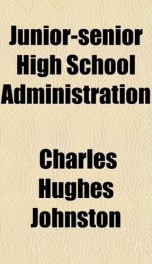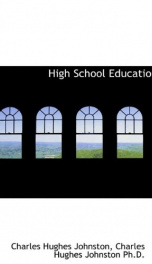junior senior high school administration

Purchase of this book includes free trial access to www.million-books.com where you can read more than a million books for free. This is an OCR edition with typos. Excerpt from book: PARTY PLATFORMS IN EDUCATION1 We will suppose the events which I am to describe to have taken place during the summer and fall of 1920: More and more had European and Far-Eastern peoples lined themselves up and wasted themselves in the gigantic world struggle of profound and opposite principles of philosophy, social justice, economic interests, political organization, and individual right. More and more serious and reflective and awed had American peoples become as the sharply opposing views of life battled on with the hopeless automatic common soldiers of the trenches as their mechanical instruments of war. Americanseven the ranks of teachersbegan to recognize the profoundly incompatible principles which, underneath the immediately human aspect of the war,were bidding for our homage, our approval, our loyalty. We all, even teachers, began to see clearly in the present world situation a spectacle of the breakdown of nationalism as the welding philosophy of politics of races or of cultures. We began to see on this vast scale that we were not ourselves involved in this actual demonstration of failure of educational ideals for any virtue of our own, but merely by our accidental geographical position. Seeing more clearly this real issue underneath the world's awful but indeterminate brute appeal to force, we, after six years of paralyzed indecision, had set about a radical reconstruction of our thoughts on life, politics, philosophy, and education. 1 In the fall of 1915 Mr. Johnston presented the following chapter as a lecture before his class in high school administration at the University of Illinois. It came as the result of a previous class discussion on the necessity of a teacher having a philosophy of education, in which discussion Mr. Johnston took the attitude th...
Info about the book
Author:
Series:
Unknown
ISBN:
0874479746
Rating:
5/5 (5)Your rating:
0/5
Languge:
English
Users who have this book
Users who want this book
What readers are saying
What do you think? Write your own comment on this book!
write a commentif you like junior senior high school administration try:
Do you want to read a book that interests you? It’s EASY!
Create an account and send a request for reading to other users on the Webpage of the book!



